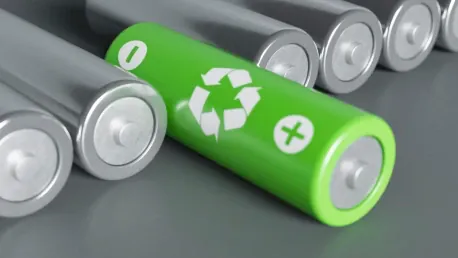Imagine a future where rechargeable batteries are not only safer but also environmentally friendly and cost-effective. This future might not be too far off, thanks to a groundbreaking development by researchers from the University of New South Wales (UNSW). Led by Professor Chuan Zhao, the team has successfully developed all-organic proton batteries that use protons (H⁺ ions) as charge carriers. Unlike conventional lithium-ion batteries, which rely on metal ions like lithium or sodium, this innovative design employs protons for rapid charge transfer and exceptional stability over thousands of cycles. A crucial component of this advancement is the use of a novel small organic molecule known as tetraamino-benzoquinone (TABQ), which serves as the cathode material. This molecule, developed by PhD candidate Sicheng Wu and Professor Zhao, is key to storing and transporting protons, resulting in outstanding performance and long-term stability, even at sub-zero temperatures. This breakthrough has significant implications for energy storage and could be a major step toward a more sustainable future.
The Role of TABQ in Proton Batteries
The innovative aspect of these all-organic proton batteries lies in the use of tetraamino-benzoquinone (TABQ) as the cathode material. TABQ plays a critical role in storing and transporting protons, providing the battery with exceptional performance and stability. This organic molecule was meticulously developed by PhD candidate Sicheng Wu and Professor Zhao. The molecule’s ability to efficiently handle protons is central to the battery’s remarkable long-term stability, even at sub-zero temperatures. This is a significant improvement over traditional lithium-ion batteries, which often face performance issues in cold environments.
The UNSW research team conducted extensive studies to monitor chemical changes during battery operation. This was achieved through advanced synchrotron infrared measurements, a cutting-edge technique that provided real-time data on the battery’s inner workings. Dr. Pimm Vongsvivut, from the Australian Synchrotron’s Infrared Microspectroscopy (IRM) beamline, collaborated with the UNSW team to develop a custom in-situ electrochemical cell and monitoring technique. This innovative approach yielded crucial chemical evidence showing that TABQ’s energy storage mechanism relies on a reversible carboxyl/hydroxyl conversion driven by proton uptake and release during cycling. This reversible process is a key factor in the battery’s efficiency and stability.
Advantages of All-Organic Proton Batteries
One of the standout advantages of all-organic proton batteries is their water-based electrolyte, which is significantly safer and more cost-effective compared to the flammable organic solvents used in traditional lithium-ion batteries. This water-based system drastically reduces safety risks and lowers manufacturing costs, making it a more viable option for large-scale production and use. Furthermore, the materials used in these batteries are abundant and affordable, which further adds to their potential as a sustainable energy storage solution. The environmental benefits are evident, as the use of non-toxic, organic materials aligns well with global sustainability goals.
Another significant advantage is the improved efficiency and performance of these batteries. Computational analysis conducted by the research team confirmed that protons are more efficiently stored in TABQ than metal ions typically used in conventional batteries. This efficient storage capability not only enhances the battery’s performance but also extends its lifespan, making it a more durable option for various applications. This finding validates the effectiveness of the all-organic proton system and highlights its potential to revolutionize the energy storage industry.
Implications for Sustainable Energy Storage
Imagine a future where rechargeable batteries are not only safer but also eco-friendly and affordable. Such a future may soon be reality, thanks to researchers at the University of New South Wales (UNSW). Led by Professor Chuan Zhao, the team has developed all-organic proton batteries utilizing protons (H⁺ ions) as charge carriers. Unlike traditional lithium-ion batteries that use metal ions like lithium or sodium, this innovative approach employs protons for swift charge transfer and remarkable stability over many cycles. A pivotal element of this breakthrough is a unique small organic molecule called tetraamino-benzoquinone (TABQ), which acts as the cathode material. Developed by PhD candidate Sicheng Wu and Professor Zhao, this molecule efficiently stores and transports protons, offering exceptional performance and longevity, even at sub-zero temperatures. This groundbreaking development holds significant potential for the field of energy storage and represents a substantial step toward a more sustainable future, impacting how we store and use energy in a more eco-conscious way.









